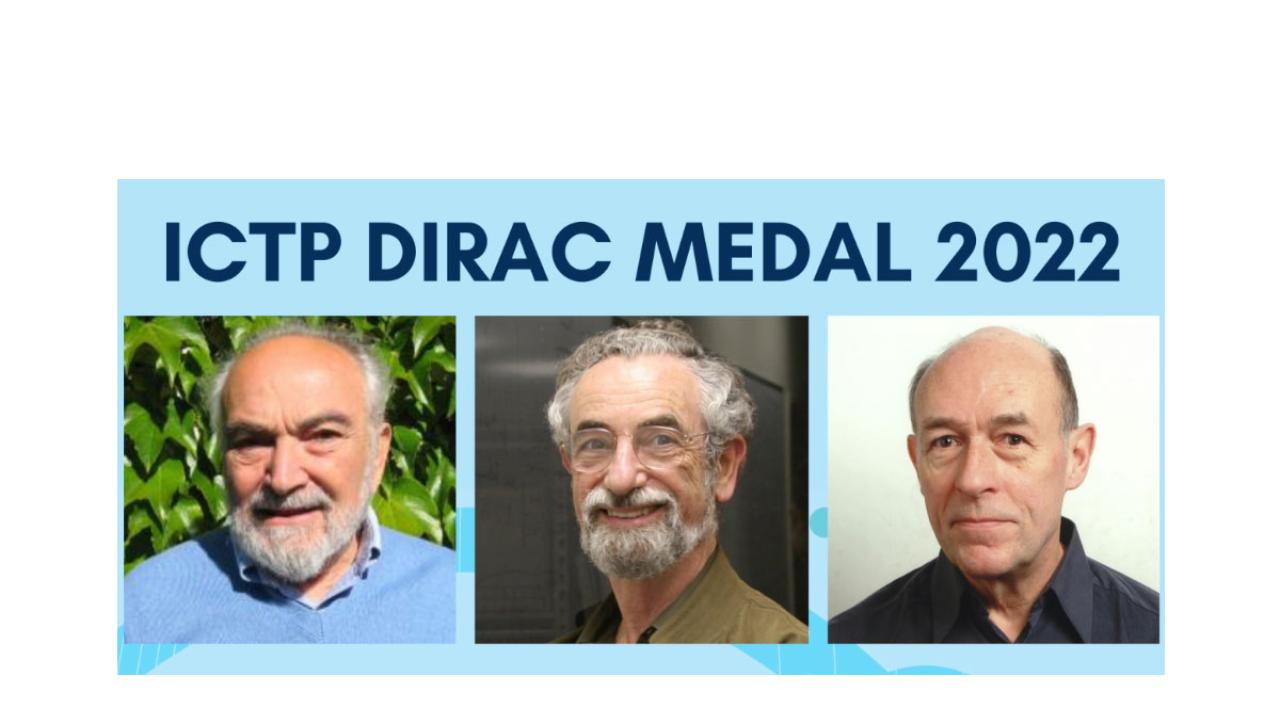
ICTP has awarded its 2022 Dirac Medal to three distinguished physicists "for groundbreaking and mathematically rigorous contributions to the understanding of the statistical mechanics of classical and quantum physical systems".
The 2022 Dirac Medallists are:
- Joel L. Lebowitz, Center for Mathematical Sciences Research, Rutgers, The State University of New Jersey, USA
- Elliott H. Lieb, Princeton University, USA
- David P. Ruelle, Institut des Hautes Études Scientifiques, France
The three physicists have received the medal for their important work in the field of statistical mechanics that has very significantly deepened and expanded our mathematical understanding of physical systems in many new directions, sometimes different from the traditional ones. Their major contributions include, among others, the study of non-equilibrium physics and large deviations; the proof of the stability of matter; the analytic solution of two-dimensional models; seminal results in quantum information theory; the definition of Gibbs states for infinite systems; and the analysis of chaos and turbulence. All three scientists were previously awarded the Boltzmann Medal, a prize awarded to physicists who obtain new results concerning statistical mechanics.
Watch: Video explainer of the Medallists' work by ICTP Scientist Erio Tosatti
The Dirac Medal is usually awarded to scientists that have followed Paul Dirac's footsteps in his belief that applying rigorous mathematics to physics is the best approach to understanding physical systems and their properties. The work of this year's Dirac Medallists reflects this approach: they used a solid mathematical framework based on statistical and probability methods to explain the macroscopic behaviour of the microscopic world of particles. Lebowitz, Lieb and Ruelle have made valuable contributions that have impacted not only the field of statistical mechanics, but that also have had broader influences on other fields of physics such as condensed matter and quantum physics.
"The massive body of work of the three Dirac Medallists for 2022 is impressive both in its scope and depth, providing new mathematically rigorous tools for the understanding of physical systems," said ICTP Director Atish Dabholkar, adding, "It has had a far-reaching impact on several branches of physics ranging from non-equilibrium statistical physics, stability of matter and quantum information theory to chaos and turbulence."
About the 2022 Dirac Medallists
Joel L. Lebowitz is a mathematical physicist widely acknowledged for his outstanding contributions to statistical physics, statistical mechanics and many other fields of mathematics and physics. With an extensive list of scientific publications, Lebowitz has had many important contributions in many fields of physics. His current interests are in problems of non-equilibrium statistical mechanics. Lebowitz has received many top physics honours, including the Boltzmann Medal (1992), the American Physical Society's Nicholson Medal (1994), the Henri Poincaré Prize (2000), the Volterra Award (2001), and the Max Planck Medal (2007).
Elliott H. Lieb is a mathematical physicist specialised in statistical mechanics, condensed matter theory, and functional analysis. A prolific author, Lieb particularly produced scientific works pertaining to quantum and classical many-body problems, atomic structure, the stability of matter, functional inequalities, the theory of magnetism, and the Hubbard model. Lieb has been awarded several prestigious prizes in mathematics and physics, including the Heineman Prize for Mathematical Physics (1978), the Max Planck Medal (1992), the Boltzmann Medal (1998), the medal of the Erwin Schrödinger Institute for Mathematics and Physics (2021) and the Medal for Exceptional Achievement in Research from the American Physical Society (2022).
David P. Ruelle is a mathematical physicist whose work on statistical physics and dynamical systems has made fundamental contributions in various aspects of mathematical physics. One of his most celebrated results, together with F. Takens, opened a new and fundamental vision on the nature of turbulence, a longstanding and challenging problem in non-equilibrium statistical physics . Moreover, due to Ruelle's approach in understanding turbulence, for the first time scientists discovered how complex behaviour could arise generically from simple physical laws. He was awarded the Dannie Heineman Prize for Mathematical Physics (1985), the Boltzmann Medal (1986) and the Max Planck Medal (2014) for his achievements in theoretical physics.
About the ICTP Dirac Medal
First awarded in 1985, ICTP's Dirac Medal is given in honour of Paul Dirac, one of the greatest physicists of the 20th century and a staunch friend of the Centre. It is awarded every year on Dirac's birthday, 8 August, to scientists who have made significant contributions to theoretical physics. Recipients of ICTP’s Dirac Medal join a list of Medallists comprising the world’s top physicists, many of whom have proceeded to win Nobel Prizes, Fields Medals or Wolf Prizes. An international committee of distinguished scientists selects the winners from a list of nominated candidates. An award ceremony, during which the three winners will present lectures on their work, will take place in 2023. For more details about the prize and a list of past winners, visit the Dirac Prize web page.
















